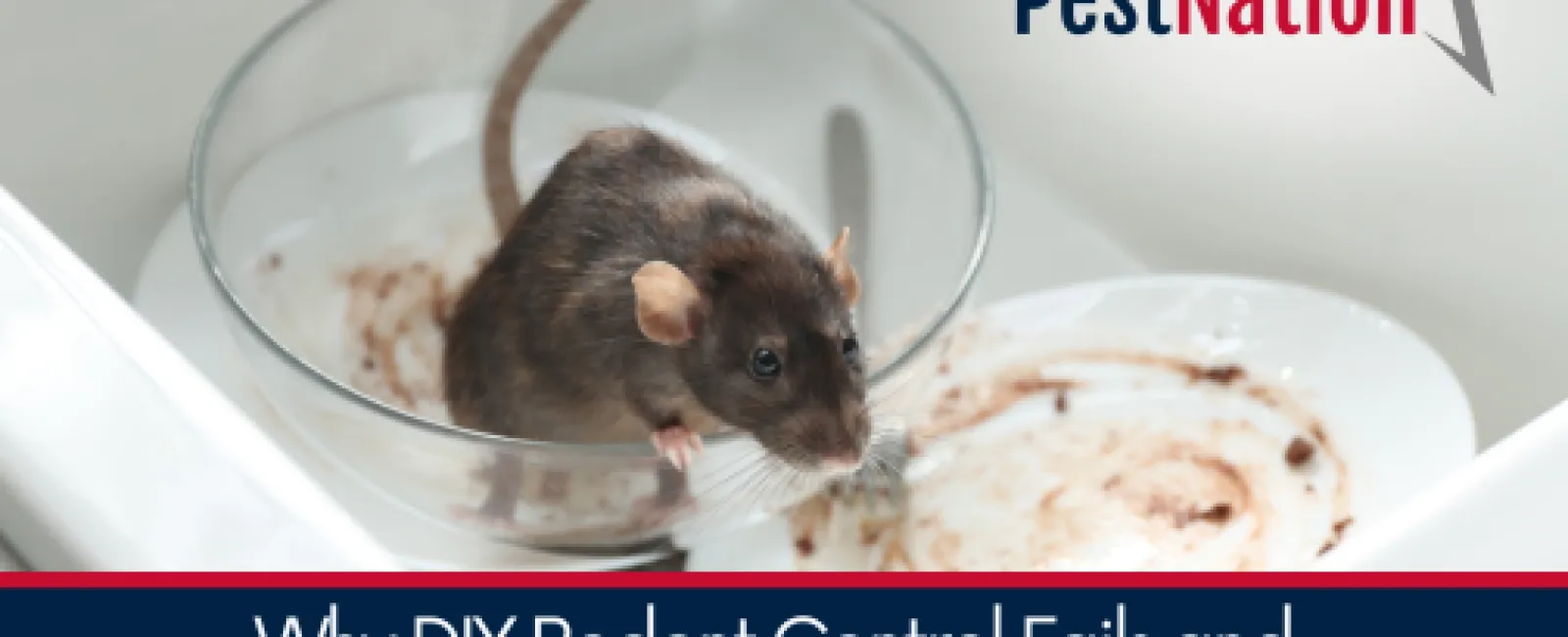Discovering rodents in your home or business is unsettling—and it's often followed by a hasty trip to the hardware store for traps, poison, or ultrasonic repellents. While the instinct to handle rodent problems yourself is understandable, do-it-yourself (DIY) rodent control methods frequently fall short. Many homeowners in cities like Atlanta, Charlotte, and Charleston attempt to tackle these infestations independently, only to find themselves dealing with repeat invasions, wasted money, and worsening structural damage. The harsh truth? DIY efforts rarely eliminate the source of the problem.
Professional exclusion services, like those offered by PestNation, represent a long-term, results-driven approach to rodent control. Rodents are persistent, adaptable, and quick to exploit even the tiniest openings in a building's structure. Unlike DIY solutions that treat symptoms, professional pest control addresses the root causes. This article will break down the key reasons why DIY rodent control often fails and highlight what PestNation's licensed experts do differently—from detailed pest inspections to targeted Charleston, Charlotte, and Atlanta interior and exterior pest treatments and exclusion methods that seal rodents out for good.
1. DIY Methods Only Target the Symptoms, Not the Cause
The biggest flaw in most DIY rodent control attempts is the reliance on reactive measures. Snap traps, glue boards, bait stations, and repellent sprays may kill or deter a few rodents temporarily—but they do nothing to address how the rodents got in or why they're staying. Without locating and sealing entry points or removing attractants, rodents simply return.
Rodents are creatures of habit and survival. Once they find shelter, food, and water, they'll stay and breed. Professional exclusion experts at PestNation don't just remove rodents; they analyze structural vulnerabilities and environmental factors contributing to the infestation. Through comprehensive PestNation pest inspections, technicians uncover entry points the average homeowner misses—behind siding, around plumbing lines, in attic vents, and more. DIY solutions might give you a short-term win, but professionals ensure long-term protection.
2. Underestimating the Rodent Problem is Common
Homeowners often believe they're dealing with a single mouse or rat. In reality, a visible rodent is often a sign of a hidden colony. Rodents reproduce rapidly—mice can have litters every three weeks. Relying on DIY solutions without a full understanding of the infestation's scale leads to recurring issues and further frustration.
PestNation's approach to rodent control begins with a full diagnostic process. Their pest inspections are thorough, combining visual assessments with monitoring tools to determine nesting sites, travel paths, and colony size. Their quarterly services ensure continued monitoring and mitigation throughout the year. In Atlanta, Charlotte, and Charleston, pest control isn't a one-time fix—it's an ongoing strategy.
3. Improper Trap Placement and Use
Trap placement plays a critical role in successful rodent control. DIYers often place traps in open, visible areas without understanding rodent behavior. Rodents typically move along walls and prefer dark, concealed paths. They also avoid new objects in their territory, making improperly placed traps ineffective.
PestNation technicians are trained to understand rodent biology and behavior. In Charlotte and Charleston interior and exterior pest treatments, for example, traps and bait stations are strategically placed in active runways and nesting areas, increasing the likelihood of effective capture. They also rotate and adjust placements based on rodent response, something DIYers may not know to do. The professional touch is not only more effective—it also minimizes unnecessary suffering for the animals and risk for your family.
4. Dangerous Use of Over-the-Counter Rodenticides
One of the riskiest aspects of DIY rodent control is the use of poisons. Many homeowners turn to over-the-counter rodenticides without understanding the potential hazards. Improper use can harm children, pets, and non-target wildlife. Additionally, poisoned rodents often die in inaccessible areas like inside walls or attics, leading to foul odors, maggot infestations, and costly cleanup.
Professionals, like those at PestNation, follow strict protocols when using rodenticides and often opt for more humane and effective exclusion techniques. They also understand which treatment options are best for different environments. Whether it's a family home in Atlanta or a commercial property in Charlotte, pest control must be both effective and safe. Professionals know how to strike that balance while complying with local laws and safety standards.
5. Incomplete Sealing of Entry Points
Rodents can squeeze through holes as small as a quarter-inch. DIY solutions often overlook these tiny gaps or use materials rodents can easily chew through, such as spray foam or soft wood. Without proper exclusion, rodents will simply re-enter once the bait or traps are gone.
PestNation specializes in exclusion—the process of sealing all potential entry points using chew-resistant materials such as steel mesh, hardware cloth, and metal flashing. During their pest inspections, they identify not just visible gaps but also potential vulnerabilities in construction. In Charleston, Charlotte, and Atlanta interior and exterior pest treatments, exclusion is the cornerstone of long-term success. It's what differentiates PestNation's services from a temporary fix.
6. DIY Doesn't Address the Full Ecosystem
Rodent problems are rarely isolated. Often, they're connected to broader pest and environmental issues. For instance, an overgrown yard may attract rodents. A nearby wasp nest might discourage natural predators like birds or bats. Food left outside for pets or birds could be another draw. DIY rodent control fails because it doesn't account for the ecosystem around your home.
With PestNation's quarterly services, technicians return seasonally to evaluate changing conditions. In cities like Charlotte, Charleston, and Atlanta, pest control professionals monitor for seasonal shifts in pest behavior, weather conditions, and structural changes to your home. Integrated pest management (IPM) ensures rodents and other pests don't return once one infestation is cleared.
7. Rodents Learn to Outsmart DIY Methods
Rodents are highly intelligent and adaptable. They learn to avoid traps, detect poisons, and even recognize repeated human behaviors. Over time, DIY solutions become less effective because the rodents have adapted to them.
PestNation's professionals stay ahead by rotating tactics, using advanced monitoring tools, and adjusting their methods as needed. They rely on industry-leading knowledge and training to stay updated on the most effective techniques. DIYers often repeat the same failed approach, but PestNation evolves its tactics based on real-time results—another reason professional intervention is essential.
8. DIY Often Ignores the Importance of Sanitation and Habitat Modification
Rodent control doesn't stop with removal. It also involves sanitation and habitat modification. DIYers often forget to address clutter, open food sources, or outdoor conditions like compost bins or woodpiles. These attract rodents and provide ideal nesting conditions.
PestNation technicians evaluate both the inside and outside of a property during inspections. They provide clear recommendations on sanitation practices and outdoor maintenance that discourage rodent activity. In areas like Atlanta, Charlotte, and Charleston, pest control is most effective when it's holistic—combining exclusion, removal, sanitation, and ongoing monitoring. That's what PestNation delivers with every quarterly service.
9. Professionals Use Advanced Technology
DIY rodent control tools are often basic and limited. Professionals, however, have access to advanced technologies, including motion-detecting cameras, ultrasonic deterrents, tamper-resistant bait stations, and digital monitoring systems. These tools enhance accuracy and efficiency, helping technicians pinpoint and resolve infestations faster.
PestNation integrates these technologies with modern solutions like In2Care systems, which are more commonly associated with mosquito control but represent the company's commitment to innovation across the board. Every tool and tactic is chosen based on its safety, effectiveness, and suitability for the unique needs of each property.
DIY rodent control can be tempting—after all, traps and poisons are readily available and seem simple to use. But the reality is that rodents are intelligent, persistent, and difficult to fully eradicate without professional help. DIY efforts often result in short-term relief and long-term frustration, not to mention the potential for health hazards, property damage, and financial loss. When you're dealing with something as destructive and unsanitary as a rodent infestation, cutting corners simply doesn't pay off.
PestNation's trained technicians deliver a level of precision, strategy, and lasting protection that DIY methods cannot match. Through detailed PestNation pest inspections, quarterly services, and expert exclusion techniques, their professionals create a rodent-proof barrier around your home or business. Whether you're in Atlanta, Charlotte, or Charleston, pest control through PestNation ensures not only the removal of current rodents but also the prevention of future ones. Don't let rodents take over—trust the professionals to keep them out for good.

